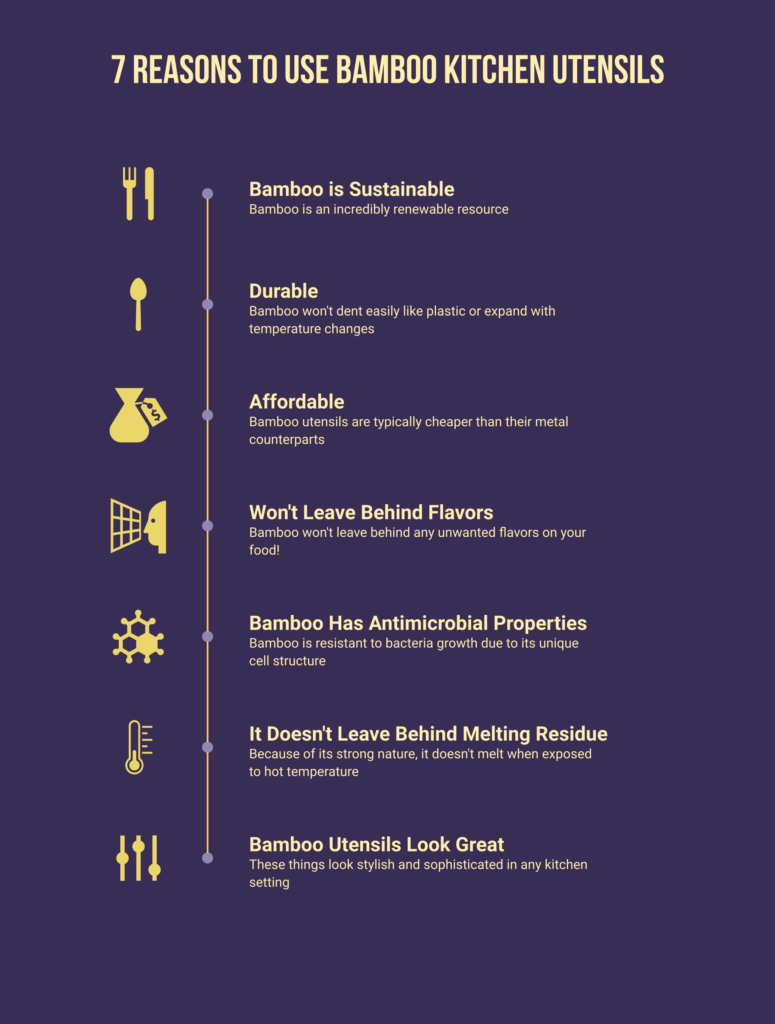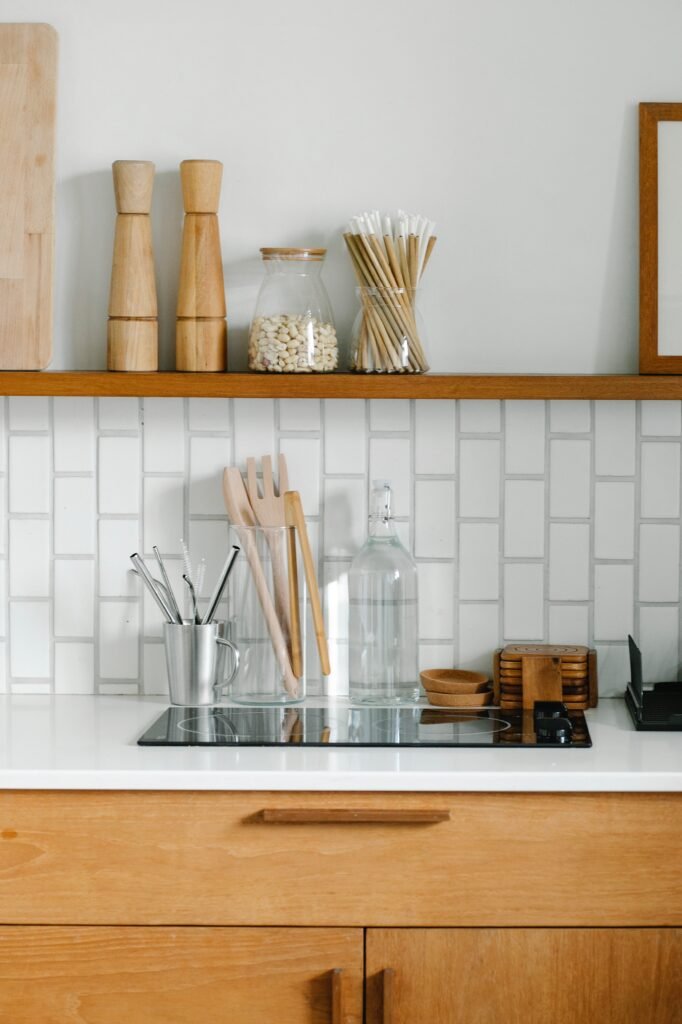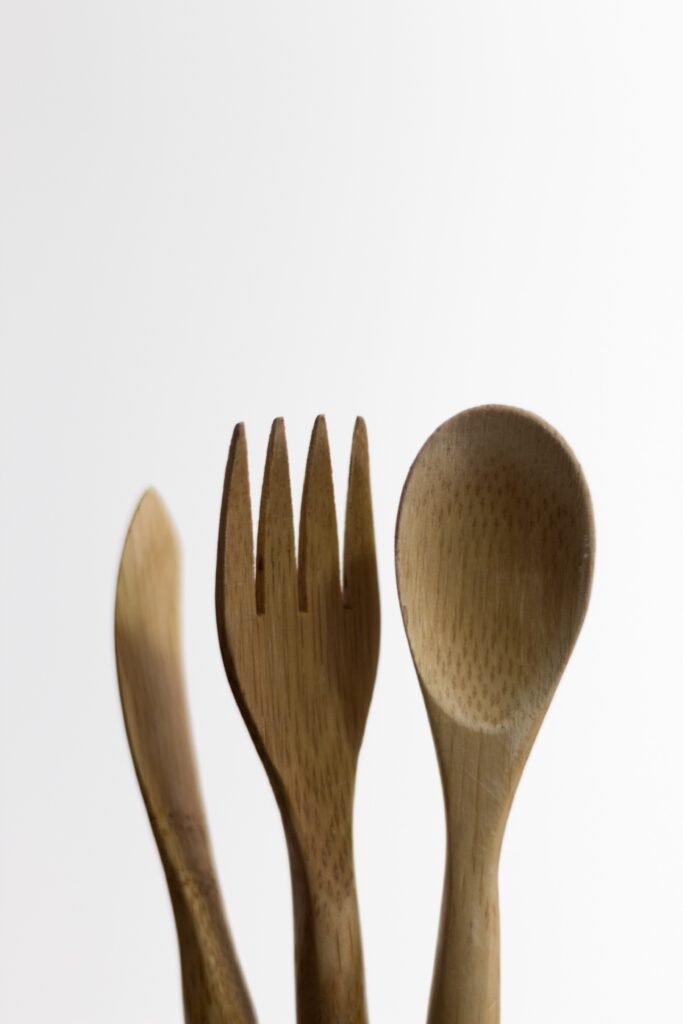How To Care For Bamboo Utensils
0Shares
Have you been thinking about adding bamboo utensils to your kitchen? Or do you already have and are looking for ways to care for bamboo utensils?
Bamboo utensils are light and elegant yet strong enough to survive all types of kitchen tasks. Plus, they won’t leach any chemicals or break down over time as plastics can. Talk about a practical way to reduce your carbon footprint – plus, it looks great too!
Therefore, taking good care of bamboo utensils can ensure that they last for a long time and stay looking like new. What’s more, bamboo is a renewable resource and environmentally friendly, so keeping your utensils in the best shape possible will reduce waste and promote sustainability.
Here, we’ll delve into the basics of caring for bamboo utensils so you can love yours as much as we do!
7 Reasons To Use Bamboo Kitchen Utensils

Do you love to cook? Are you using any bamboo kitchenware? Bamboo is one of the most popular materials for kitchen utensils, and it’s no surprise why.
We’ve gathered seven reasons why bamboo kitchenware should be your go-to for all your cooking needs.
✅Bamboo is Sustainable
Bamboo is an incredibly renewable resource, unlike plastic or wooden utensils. It grows quickly and doesn’t require nearly as much water as other plants. Plus, when you purchase or use bamboo utensils, you can rest assured knowing that you’re doing your part to help keep our planet healthy.
✅Durable
Bamboo may not seem like the most durable material but don’t let its delicate appearance fool you; it’s actually quite strong and resilient! Bamboo won’t dent easily like plastic or expand with temperature changes like wood will — so these utensils won’t get damaged over time and are perfect for everyday use in the kitchen.
✅Affordable
Not only is bamboo environmentally friendly, but it’s also very budget-friendly as well! You don’t need to break the bank to get quality kitchen tools — bamboo utensils are typically cheaper than their metal counterparts but offer equal quality in most cases.
✅Won’t Leave Behind Flavors
Bamboo won’t leave behind any unwanted flavors on your food! This means there’s no need to worry about getting any funny tastes from previous meals interfering with your current culinary masterpiece — what more could you ask for?
✅Bamboo Has Antimicrobial Properties
While other materials may hold onto bacteria from previous meals, bamboo is actually resistant to bacteria growth due to its unique cell structure and natural antimicrobial properties! This means that even if you forget to wash them immediately after using them, they’ll still be safe to use later on down the road (just make sure to give them a good scrub before cooking).
✅It Doesn’t Leave Behind Melting Residue
It might be surprising, but some materials (like not-so-durable plastic) can leave behind melting residue when exposed to hot temperatures — which makes it difficult to clean up after cooking sessions in the kitchen. Thankfully, because of its strong nature, this isn’t something you’ll have to worry about with bamboo utensils!
✅Bamboo Utensils Look Great
Last but certainly not least — let’s talk about how great these things look! Whether it’s the natural grain patterns or rich hue along its surface, there’s no denying that these things look stylish and sophisticated in any kitchen setting 🙂
How To Clean Bamboo Utensils

It’s important to clean your bamboo utensils regularly to maintain their longevity and enjoy the benefit of using them for many years. Bamboo is a naturally durable material, but it’s porous and can absorb dirt and other particles if not cleaned regularly. Not only will this make your utensil less appealing and presentable, but it could also introduce bacteria or other contaminants that could affect the taste or safety of your food.
What You Need
Cleaning bamboo utensils is pretty straightforward, but there are some tools you need to make sure you do it properly:
- A soft scrubbing brush or sponge: This should be non-abrasive to prevent scratches on your utensil’s surface.
- Warm water and mild soap: Don’t use harsh chemicals as they can damage the bamboo fibers.
- A clean cloth: Use this after cleaning to remove any excess moisture.
Step By Step Guide To Cleaning Bamboo Utensils
- Start by rinsing off any food particles or residue with warm water. Make sure you rinse both sides of your utensil thoroughly before moving on to the next step.
- Add some mild dish soap directly to the brush/sponge and then scrub away any remaining residues from both sides of the utensil with light circular motions.
- Rinse off all the soap with warm water until no more foam or suds are left on the utensil’s surface.
- Dry off the bamboo utensil with a clean cloth so no excess moisture is left behind before storing it away in a dry location out of direct sunlight.
Tips For Caring For Bamboo Utensils

Once your bamboo utensils are clean, here are some additional tips for keeping them in the best condition for as long as possible:
Soak in Vinegar for Extra Cleanliness
If you’re looking for a way to clean your bamboo utensils without harsh chemicals deep, try soaking them in white vinegar! You can easily whip up a vinegar solution by mixing one part vinegar with four parts water, then submerging your utensils in the solution and allowing them to soak for twenty minutes or longer.
The vinegar’s high acidity helps break down any built-up residue, giving your utensils that like-new shine! Afterward, be sure to give them a thorough rinse with cool water and allow some time to dry before use.
Hand Wash Your Bamboo Utensils
Did you know that washing them by hand is not only the most eco-friendly option but often results in cleaner utensils? It’s true! By washing your utensils by hand, you not only get off all of the stuck-on food and any germs but also allow yourself to inspect them for any wear and tear.
Although this may require a few more minutes on your part, it’s worth it for these amazing utensils. So, don’t be afraid to take a few moments out of your day to ensure that your bamboo utensils are clean and properly cared for – you’ll be glad you did!
Avoid Frequent Dishwashing
Hey, have you heard about the importance of avoiding frequent dishwashing for bamboo utensils? It’s actually quite easy to forget since so many of us are used to just plucking any type of utensil in the dishwasher!
Apparently, however, regular hot water and soap do not really agree with bamboo. Not only can it cause some staining on the utensils, but it can also weaken them over time.
Avoid leaving it in Water for a Long Time
Bamboo expands when it gets wet and will start to absorb moisture which can cause changes in shape and possibly even cracks, making the cookware unusable. The best way to avoid this is by only soaking for as long as necessary, so if you need to clean your bamboo cookware, remember – to keep an eye on the clock!
Use Wood Oil
Wood oil is an essential part of taking care of your bamboo cooking utensils. Whether using a bamboo fork, bamboo cutting board, spoon, or spatula, this special oil prevents splintering and keeps your cookware looking great. It’s easy to use, too – simply spread a thin coat of the oil with a clean cloth and let it sit for 30 minutes before wiping off any excess with a dry cloth.
With daily use, wood oil can even give your bamboo utensils an attractive sheen while extending their life!
Frequently Asked Questions
Q: What does a bamboo cutlery set include?
Each bamboo cutlery set typically includes a bamboo spoon, fork, knife, and even a pair of chopsticks — all made with renewable and highly durable bamboo fiber. Bamboo fiber is sturdy enough to withstand even the most stubborn dishes without breaking or becoming discolored over time. Plus, since most bamboo cutlery sets are reusable, they don’t contribute more pollutants to the environment.
Q: What other bamboo products are available?
If you thought bamboo was only used in construction and furniture, think again! Bamboo-based products encompass a wide range of items, from the grassroots to the glamorous. The most basic products are everyday utensils, such as trays, plates, and chopsticks. Meanwhile, we have designer furnishings, accessories, and other fashion items made from exotic bamboo varieties at the higher end of the spectrum. Plus, there is tons of fun stuff, too – did you know that many martial arts classes use bamboo sparring sticks for training? As you can tell, bamboo is a versatile material with abundant potential for creativity!
Q: Are plastic utensils better than bamboo?
The debate over plastic versus bamboo utensils is an interesting one. On the one hand, using plastic utensils is convenient because they are cheaper and easier to source. Plus, modern plastics are often recyclable or biodegrade quickly. On the other hand, bamboo cutlery is sturdier and more eco-friendly since bamboo is a naturally renewable resource. Ultimately, it comes down to what you prioritize – convenience or sustainability.
Q: How does bamboo conditioning oil help keep my utensils in good condition?
Bamboo conditioning oil is a special kind of oil that helps keep your kitchen utensils in tip-top shape! It’s made specifically to handle the wear and tear of cooking daily. Regular use of bamboo conditioning oil can help protect your utensils from corrosion, tarnishing, and discoloration. Not only does this oil maintain the original luster of your utensils, but it also makes them more durable – so you don’t have to worry about replacing them as often! Best of all, bamboo conditioning oil is easy to apply with a cloth or paper towel and isn’t very expensive. So if you want to prepare your kitchen for epic meals, just grab some bamboo conditioning oil today and ensure your utensil game is strong!
Q: Why is it my bamboo cooking utensil is getting warped?
It’s a common problem, but not one with an easy answer. Like many natural materials, bamboo is no stranger to absorbing moisture and warping as a result – this can happen when exposed to too much water or left sitting in the sink post-washing. Unfortunately, it seems like the only way to combat this problem is to replace your tools when necessary. However, try not to submerge them in water for prolonged periods, air-dry them after washing and ensure they are stored away from any excessive humidity.
Final Words
Taking care of bamboo utensils isn’t hard at all – in fact, it’s a breeze! Because these utensils are naturally antibacterial and have a wood-like outer layer, you can hand wash them to make sure they stay clean and bacteria-free without worry. It’s also suggested to oil them once every few months with food-grade mineral oil or beeswax to prevent cracking, but really that extra step is totally optional. Overall, bamboo utensils are an easy but chic option for kitchenware: you have to give them a good rinse after each use, and you’re good to go. Plus, you get the added benefit of using eco-friendly items as well!
0Shares
